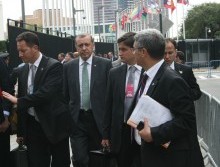 Turkey has decided to accept humanitarian aid from Israel following a 7.2 magnitude earthquake that has killed hundreds and injured more than 2,000. Despite the aid, Turkey is still sticking to its preconditions on restoring diplomatic ties with Israel, which were diminished by Turkey earlier this year. According to Israeli officials, the assistance includes multiple mobile structures, including electrical infrastructure, 2,000 fleece blankets, 2,000 fleece coats and 100 inflatable mattresses.
Turkey has decided to accept humanitarian aid from Israel following a 7.2 magnitude earthquake that has killed hundreds and injured more than 2,000. Despite the aid, Turkey is still sticking to its preconditions on restoring diplomatic ties with Israel, which were diminished by Turkey earlier this year. According to Israeli officials, the assistance includes multiple mobile structures, including electrical infrastructure, 2,000 fleece blankets, 2,000 fleece coats and 100 inflatable mattresses.
The first shipment left for Turkey yesterday and another is set for Friday. According to the Israeli Defense Ministry, several hundred containers are also to be shipped to Turkey via sea. Other nations are also sending aid to Turkey.
The Israeli effort comes less than two months after Turkey significantly downgraded diplomatic relations with Israel in the aftermath of the 2010 Gaza flotilla incident. Activists trying to break the Israeli naval blockade attacked Israeli soldiers seeking to commandeer the vessels, who then sought to defend themselves. Nine activists with links to Turkey were killed in the May 2010 incident.
Israeli Ministry of Foreign Affairs spokesman Paul Hirschson, speaking via email with The Mideast Update, said while they hope to reverse the current diplomatic troubles with Turkey, that was irrelevant in deciding to send aid.
“We offer aid to countries in need. We have a long history of mostly fantastic relations with Turkey,” said Hirschson. “That we currently have a disagreement with them is not relevant… This is what we do—we have a well known expertise and record in the area of disaster recovery and relief.”
He pointed out that Turkey came to Israel’s aid with firefighting planes during the 2010 Carmel wildfire, as well as noting that Israel helped Indonesia following a tsunami there despite the fact that the two nations do not even does generic valium look like have diplomatic relations.
“Of course we hope to improve relations with Turkey, but that was so prior to the earthquake as well,” said Hirschson.
So far it appears the aid isn’t going to change Turkey’s conditions on healing relations, which include a demand for an official apology for the deaths of the flotilla activists. Israel expressed regret at the loss of life, but says its soldiers acted in self-defense.
The English-language Turkish newspaper Today’s Zaman reported that Turkish Foreign Minister Ahmet Davuto?lu said his nation’s “political conditions remain” before relations with Israel can be restored, despite the aid. He further said that Turkey differentiates between political and humanitarian links, also pointing out last year’s wildfire assistance to Israel.
According to a press release on the Turkish Disaster and Emergency Management Presidency website, the death toll for the earthquake has risen to 534 people as of Thursday morning. 2,300 people were reported as injured in the quake, which struck on Sunday afternoon. So far, 185 people have been evacuated alive from the debris.
Hirschson said in his email to The Mideast Update that the mobile structures being sent to Turkey can technically be used for accommodation, storage, medical treatment or “pretty much any other purpose requiring a physical structure.”
In addition to the material aid, Israel also decided to send personnel to act as instructors on how to set up the structures. Hirschson said the personnel would not be going to the disaster area and said they would not stay very long.
Israel often sends aid to countries following disasters, including the medical team sent to Haiti that was praised by international media following the 2010 earthquake.
(By Joshua Spurlock, www.themideastupdate.com, October 27, 2011)
